Introduction
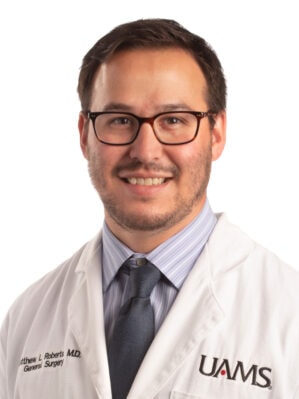
Listen to Dr. Matthew Roberts, an Assistant Professor in the Department of Surgery and a trauma surgeon and surgical intensivist, as well as ECMO provider, talk about his journey to and through medicine, as well as his interests and lessons learned along the way. We talk about topics like the future of his surgical interests at UAMS, as well as how he has been able to integrate his work with life outside of the hospital over the years.
Transcript
Manasa: Welcome back to Mentor Spotlight. Today, we’re talking to Dr. Matthew Roberts, an Assistant Professor in the Department of Surgery. He’s a trauma and emergency general surgeon, as well as a surgical ICU provider at UAMS. While from Missouri, he completed his surgical training at UAMS, and has continued to practice here. He loves to teach, and is known by many from nurses to other physicians for his work ethic as well as dedication to patient care. So without further delay, let’s talk to Dr. Roberts. So can we start off with you telling us a little bit about yourself?
Dr. Roberts: Yeah, I’d be happy to. Thank you for having me. This is, I think a really cool thing that you guys are doing. And I’m excited to speak with you all. A little bit about myself. I come from very humble beginnings. And I like to think of myself as somebody who maybe wasn’t set to do surgery, but worked hard and was able to get to the point where I am today. Enjoy my career in surgery.
Manasa: Yeah. So can you tell us a little bit about your job titles, all the different positions that you hold, and what you kind of do for each of those. Like all the hats that you wear.
Dr. Roberts: Yeah, so predominantly I’m a trauma and emergency general surgeon. So majority of my clinical work is gonna be taking care of sick trauma and, and emergency general surgery patients. So that’s patients who come in with perforations – perforated bowel, incarcerated hernias, gallbladders, appys – those kind of routine things. But then we do get a little bit more complicated stuff. And then, another large part is doing our surgical ICU work as well. So seeing these patients in ICU and making sure that they’re fully resuscitated and recovering. So that’s a large part of my clinical work.
In addition to those things, I also have a pretty robust elective surgery practice, and so what that entails is predominantly, you know, basic gallbladders, hernias, things like that. Now, I also do a fair bit of peri-esophageal hernias. So patients who have been having long, long-standing issues with hiatal hernias or reflux disease. Some of the complex foregut work, I’ve been doing. And most recently, I’ve been doing robot, robotic surgery. So it’s been fairly new to our group, although not new across UAMS. But something that is becoming ever more prevalent with residency training and so a goal for me was to be able to provide that experience to our residents. And make sure that they have plenty opportunities to get those skills early on. And in all settings, not just more specialized surgical services, such as surgical oncology, or thoracic surgery, or colorectal surgery. And in addition, I’m also doing ECMO. So occasionally I’ll do ECMO support for patients who have severe lung disease and unfortunately, these patients when they don’t have a lot of options, you know one way that we can do that is by providing lung bypass support. And that’s something that is very rewarding, and a very busy aspect when we do start having those patients.. But very exciting field that I’m also able to provide some additional expertise in.
Manasa: That’s awesome. I think I’ve – I don’t know too much about ECMO, I’m trying to learn about like the different aspects of everything, but – it’s amazing the process that you go through to figure out if a person can sustain being on ECMO to get potential further treatment. But then also learning of the treatments that they would need in the future but then all the policies and kind of nuances that you don’t really think about, in terms of like what can be possible for that patient in the future.
Dr. Roberts: Yeah, when we first started doing this, I think we were all very new to that here at UAMS. And ECMO has been around for a long period of time, but having the ability to do it here is relatively new. And it was started as, yeah, kind of the start of COVID. To be able to help support those really sick COVID patients. And so, it was very, very much a learn by doing process, you know, as we, as we took that, took that population on. And it’s been very rewarding. It is very nuanced in terms of how we select patients for ECMO support and who is a candidate and who is not a candidate, although there are some basic, basic guidelines in which we use to select those patients. But there’s a lot of little details that go into decision-making, and that’s why we have our ECMO support team. In which any of these patients who are consults for ECMO therapy, we do a conference call and we all discuss, you know, so all of the ECMO providers will all discuss the patient. And everybody kind of makes a vote on if they think that that is an appropriate candidate. So it’s a very multidisciplinary approach, just like most things in medicine, but it’s very rewarding whenever we do have those patients that we can provide that therapy for. And I feel very happy to be able to learn that technique and be able to be one of those providers as well.
Manasa: Yeah. So in terms of you being involved with that, I saw that you were part of the steering committee for that. So in terms, other than all these other hats that you wear in terms of or your clinical things. So you’re a part of that committee and you do a few others QI committee work as well, right?
Dr. Roberts: Yes.
Manasa: And then you also like enjoy teaching, and so you’re part of the medical student education side of things. So can you explain that a little bit as well.
Dr. Roberts: Yes, so as far as my administrative duties, most of the major work I do as far as leadership roles is, is with ECMO program, although, yeah, we have our quality improvement projects throughout our trauma and, and surgical ICU. So, I’m involved with those. And then as far as educational aspects, that’s another big focus of mine and something that I very much, am going to do. So I always fine times to help students out in whatever, whatever they need. Whether that’s me as an advisor, or helping them identify, you know, another advisor recognizing, you know, where they are at in their career, and helping them get to the point that they want to be. And so ways that I’m able to provide those educational opportunities is most, most students will see me, doing surgical bullpen with all the third years, so hopefully they still enjoy doing that. And then I do a lot of mentorship for third and fourth years. And, helping them guide them through the, the difficult process of identifying residencies and matching and all that stuff. And then for residents, I, hopefully I’m able to provide some of the same mentorship. You know, helping them with deciding if trauma or emergency general surgery, general surgery is a career for them. And helping them with recognizing, you know, what they need to be able to get to those destinations. So, that’s something that I feel like is very important, to be a mentor and listen- and I think that’s a big part of it- is just listening what, what a student, what a resident needs, and what they envision and helping them get to that, that destination.
Manasa: Yeah. So can we talk a little bit about your educational background, the training you had to get to where you are today.
Dr. Roberts: Yeah. So I started out pretty much all over the place. We moved a lot when I was a kid. We don’t need to go back that far, but ultimately I ended up at the University of Oklahoma for undergrad. I was there for a few years, and my wife was actually, she was moving to Joplin, Missouri. So I moved down there and went to finish off undergrad at Missouri Southern State University. And so that’s how I ended up in Missouri. And then I went to the University of Missouri for, for medical school in Columbia, Missouri. And then after medical school, I was fortunate to match down here for a residency. My wife was terrified of moving Arkansas, and then everything worked out. But after residency, I realized that I had a passion for trauma surgery- a lot of my mentors were here. And so I decided to take the fellowship for trauma/surgical critical care. I did a one year fellowship here and then kind of stayed on as faculty ever since. Additional training that I’ve done is some additional robotic training, yeah, over the last year.
Manasa: I think that’s a generally known reaction whenever people hear Arkansas, just wherever I talk.
Dr. Roberts: Yeah
Manasa: So, I guess we kind of talked about this already. But, in terms of your journey here, were there any jobs held along the way, any other career paths or thoughts you had along the way that you explored a little bit, then decided to switch over?
Dr. Roberts: Yeah, I, so I recognized that I was, I wanted to do medicine pretty early on. And going through undergrad and into med school, I thought I was gonna do orthopedic surgery. And I realized that orthopedic surgery is very specific. I wasn’t going to be able to do a broad range of things. It was pretty much focused on – to me – it was focusing on a very particular subset of surgery. That just wasn’t something that I felt like was going to be the experience that I wanted. And then in my third year, I didn’t do surgery till my last rotation. And I did OBGYN my third year, I was doing a lot of gyn onc. And so I thought, oh, okay, I can do gyn onc. And so I’d, I’d set up my fourth year for doing OBGYN. And I started my fourth year, very quickly realized that OBGYN was not for me. I think I spent one day in gyn clinic, which I hadn’t done in my third year. And then I was done. And so I just decided surgery was the, was the route I wanted to go. So I was kind of a late, decision on doing surgery. I just wanted to make sure that that was gonna be the right fit for me. I was a father through med school, so I was very concerned whether or not I could balance being a family man and going through a surgery residency, which I’ll say is, is completely doable. You know, I think there are sacrifices with any, any training, but surgery, just because you’re doing surgery doesn’t mean that you can’t, you know, have a family and things like that. Which is something that is often told to students, you know, throughout their training. So. And, you know, throughout that, I took no breaks. Just kind of went, went through, you know, med school- undergrad, med school. And then, straight into, to surgery training. You know, throughout the way for me, because I was a father at a early time, I did have to work a lot. So I balanced three jobs through undergrad. You know, while having a kid, and family, and all those things.
Manasa: So if you had to describe your passions and interests within this field. You kind of talked about how you developed your interest for general surgery and being able to do broad things. But I guess what is it that drew you to trauma surgery? Some of it was the mentors that you had mentioned. But…
Dr. Roberts: The biggest thing for trauma is it’s exciting. I think, or anybody who is in surgery, and you’re doing a major trauma case. And you see the amount teamwork and effort that’s involved. And kind of the excitement that’s involved. That’s something that, that adrenaline rush is something that is hard to, to let go away. And I think if, I think early on that’s the initial trigger for trauma. Is you have an experience like that. Like, wow, that was really incredible. And then you see the results of what you’re able to do when somebody is in extremis and literally bleeding to death. And you’re able to, to control that and stop that. And, you know, return them back to, to life essentially. You know, that’s something that is very incredible. And very rewarding. I think the, so the cases for now, you know, these are very complex cases that you may get.
You’re able to operate in different parts of the body. Very complex cases. But it’s very much a team effort. It’s not just one person who’s able to you know, get this patient through their hospital course. It’s, it’s very much relying on everybody. And so I think having that, seen everything that’s involved with those type of cases, is something that led me and drew me into wanting to trauma surgery. The culture of trauma and the providers that are in, that are in the trauma field are some of the most amazing people I’ve ever met. And everybody is very willing to support one another. I think it’s a very collegial field in most settings. And I think just the overall, kind of group atmosphere that we have, especially in this trauma department, is something that drew me in very quickly. I think just recognizing the friendships that I made early on. And the mentorship that I had early on. Just kind of sealed the deal for me that this is, this is what I wanted to do.
Manasa: Were there any things that made you question, not necessarily like deterred away from the specialty, but made you think hard about your choice? Whether that, that was like the bad outcomes that don’t always result in-
Dr. Roberts: Yeah, and its, I think you always – anytime that you’re trying to make a decision on what you’re going to be doing for the rest of your life – you do need to question everything. So regardless of what field that you choose. You know, this is something that is going to be what you do day in and day out. So you need to question, you know every little thing about it. So for trauma for me, it was, really trauma in some settings is, is not a lot of operative intervention. And so I love operating and I love being able to provide, provide, you know, my expertise with your technical ability and so. Not being able to operate routinely was something I was concerned about. So nowadays, you know, operative intervention for trauma can be as low as, you know, 20%. If not less. And so, there’s gonna be a lot of time where you’re not getting additional operative cases. And so I didn’t want to be going into a field that I not, I’m not, getting, you know, routine cases and that my operative ability maybe, you know, may decline because of that. So I had considered vascular surgery, you know, things like that, that did a lot of your routine, technical cases. But, you know, I think part of it is relying on doing general practice and emergency general surgery to where you are getting in, getting the additional cases and stuff that you need. You know, whereas trauma is not always going to be an operative experience.
So that was part of it. The other thing I wasn’t quite sure about was- the schedule for trauma can be, you know you’ll be doing nights, you’re going to be doing some shift work, but it’s not like, you know, just doing general practice where you’re gonna have your clinic for a couple days and then you’re gonna have your set operative dates. It’s going to be a little bit more varied. So that was another thing that I, you know, had long thoughts about, but ultimately, you know, that wasn’t a big deal for me. I enjoyed the, the variety of, of things that we see for trauma and emergency general surgery, and even the variety in the schedule. I enjoy that. You know I am not- every single day is different.
Manasa: Yeah. I think that is something unique that I’ve seen within surgery- within like different specialties- in that for trauma, you can do acute care, trauma and critical care, which is not common to have that variety in your daily, every day like experience.
Dr. Roberts: Yeah.
Manasa: So within this field, are there specific topics you’re interested in, or research specifically, or any things like that that students can learn more about?
Dr. Roberts: Yeah. Right now, I’m not doing, I’m not doing much research. Most of my, most of my roles are pretty heavy into doing educational and some administrative duties with the ECMO program. I am very passionate about our trauma department and, and specifically things that I very much enjoy are, are outcomes with major trauma intervention, such as, you know, vascular injuries, things like that. Other things that I, have a, kind of a big role, as far as not necessarily research, but as far as clinical interests- my elective practice with foregut is something that has continued to be a big focus. More at it, more as a needed, needing to fill a demand from the department. You know, we had, unfortunately when we, when Dr. Bonwich had retired, she had done a lot of foregut work and so filling in that role of providing additional foregut expertise was something that I, I developed and have continued to enjoy. And so that’s something that we have a lot of growth that we will continue to make, and we are hopefully going to be starting a foregut multidisciplinary group, with the, with the hopes of even later, you know, a Foregut, you know, Center of Excellence, which that’s a long way off. But ultimately making this a multidisciplinary, multidisciplinary field with GI and with thoracic surgery, and with myself.
Manasa: And so, for just our listeners like me who have very little knowledge about different like anatomy aspects. So I guess foregut includes like para-esophageal hernias and like Nissen fundoplications.
Dr. Roberts: Yeah. The major area for foregut when we discuss that is going to be the lower esophagus, stomach, and the duodenum. So anything of that area. You know most foregut places are going to be managed by bariatrics, which we don’t have bariatrics here. And so some of these complex patients that don’t really have, you know have a bariatric surgeon, you know, that’s where I can help provide a little bit of, I can provide that, that surgical need that they may have. So most of the stuff that we see here is going to be largely para-esophageal hernias and, and reflex disease, which the thoracic surgery group does a lot of. Unfortunately they’re, they’re very busy dealing with esophageal cancers and, and lung cancers and stuff like that. So there’s still a lot of those patients that still need support. And so that’s where I’m able to help out with that. And then, you know, more benign causes of, you know, gastric issues and duodenal issues, and, and our group can deal with that too. You know, if it’s gonna be a, a malignant process, that’s gonna be dealt with with the hepatobiliary surgical oncology.
Manasa: Ok yeah, that’s cool. If you had to describe the coolest thing you’ve done so far in your career. Or like the most interesting or excited, exciting thing that you’ve done.
Dr. Roberts: Hmmmm. That’s, that’s a tough question. Is that as far as a case or as far as a just achievement throughout?
Manasa: Whatever you think.
Dr. Roberts: Okay.
Manasa: And we can come back to it… To think about…
Dr. Roberts: Yeah, I’ll have to think about that one.
Manasa: Okay. So we’ve talked a little bit about your clinical interests and everything. If you had to talk about outside the hospital, what are your passions outside the field or just outside of medicine in general?
Dr. Roberts: Yeah, outside of medicine, it is definitely my family. I was a dad very early in my life. And so I’ve been a father more than I was ever a, you know, a young 20 year old. So I, my passion is definitely my family and spending time with them. I have three kids. You know, I have a lovely wife who’s a veterinarian, and so the times that I have outside the hospital are, you know, geared at doing the family things.
Manasa: Yeah. And so I guess a question related to that, because we are, this is a surgical specialty that’s known as being hard to balance or integrate into like, between work and life. How would you describe the balance that you’ve been able to form over the years and how you try to maintain that while also being someone that works hard at the hospital and cares about their patients?
Dr. Roberts: Yeah, it definitely is difficult. But it is completely doable. I think one, you need, you can’t, you can never do things on your own. Through any residency, especially surgery. So you need to have support, no matter, you know, whether or not you have kids or no kids, you know, things like that. And so a large part of that for me was I had, you know, support from my wife and, you know, and other family that was able to, you know, come and help us out. You know, she a veterinarian, so we were both very busy, you know, early on in our careers dealing with those things. So. There was a lot to balance. I think recognizing that there’s times to make sacrifices for your career, for being in the hospital for your patients. And then there’s times to, that you have to make sacrifices for your family. And sometimes it’s kind of difficult to make that decision at the time, but, you know, as you go through that, you kinda recognize, okay, this is, these are the times that, you know, I can, I can say that, you know, somebody can do that at the hospital. I don’t need to be there to deal with that issue. And, you know, other times where, you know, this patient’s relying on you and, you know, sometimes you’re gonna have to be late for I guess, you know, dinner with the family, things like that. It’s challenging, but you know, we all go through that in life. It’s just something that you get more experience with.
Manasa: Would you say you have any hobbies or anything that help you have stress relief for like if you’re having a really bad day?
Dr. Roberts: Yeah. Hobbies are terrific and you, we all need hobbies. Especially, you know, dealing, being in the hospital. You know, when you’re there for a long period of time, then you need something to escape to. Yeah, for me, yes, a lot of that’s spending time with my family. And then I love enjoying going for runs, and sports and do a lot of boxing. I’m not a boxer or anything, but it’s just something that I can, you know, go to the gym and hit the bag for a little bit, things like that, that can take my mind off things. And so that’s something that is definitely been able to help me escape from the stresses that we deal with in the hospital.
Manasa: I tried kickboxing for a little bit early on in med school, figured out it was not for me, but hey, to each their own for what they like.
Dr. Roberts: Yup.
Manasa: What are you currently working towards, in terms of like big long-term goals for the future?
Dr. Roberts: Yeah, long term goals are. Robotic surgery has kind of been the biggest thing. It’s not something that I see being the sole part of my career, but recognizing what application I can use it for for my patients. And most of those patients are going to be my elective general surgery patients, but some of it may be applicable to my emergency general surgery patients. And so that’s kind of one of the big things. And then clinically, as far as, you know, through administrative goals, I’m hopeful that, you know, through, we can continue to expand our ECMO department and continue to build up our trauma program department. It’s already grown so much and I think we have a good group of, of faculty members that, you know, I learn so much from every single day. And so I think that, just the group that we have, I, excited to be a part of this division and see it, see it continue to expand.
Manasa: Yeah. If you had to say, oh I wish this was different in health care or patient care, just like your thoughts about the system or things like that.
Dr. Roberts: Yeah, I mean biggest thing is, you know, just ease of access for some of our patients. You know there’s a lot of our patients that unfortunately, they, they have a hard time getting to the hospital, or being able to get things provided, and being able to provide, you know… You know, they need, they need a hernia done and they can’t get it approved so they’re out of pocket. You know, those things are the biggest frustrations that you know, this patient needs something done and unfortunately we have to go through all the, all the hoops and rigmarole, rigmarole to try to get that taken care of. So that’s frustrating and that’s something that I would love to see, you know, improve.
Manasa: If you could give one piece of advice to students today, what would it be?
Dr. Roberts: Biggest thing is, you know, if you ask me, five years ago, going through, you know when I was in residency or at the, towards the end of my residency. It would have been, you know, just keep working hard and continue to- you know sometimes you have to make sacrifices for your patients and just dedicate yourself to them. You know, I think, you know, I would still say that with the caveat that you need to take care of yourself. And so learning that balance, you know, for yourself. Everybody’s different, you know, so what they need for recovery from, you know, being in the hospital, things like that, can be different. So recognizing those things in yourself, you know, just make sure you take care of yourself too. And there’s, there’s a lot of people that will, will help you. And so reaching out and finding people that can help you and guide you is something that I think is very important. It’s only gonna make it easier as you, you know, work your way through your career.
Manasa: And then, the reverse of that I guess, is what is the best piece of advice?
Dr. Roberts: Yeah, one of the, probably the best piece of advice for me was, was actually from Dr. Steliga. And I think I was through my, when I was a third year or fourth year in residency, and I was just spending a lot of time in the hospital and… He just came to me and said that, you know, just, just always remember to, to just take care of yourself. You know, it’s, it’s very important that, you know, what we do is demanding and hard work and that is crucial. However, you just have to recognize that there’s other people in the hospital that can help out with things too. And that was very helpful for me kind of recognizing that, okay, there’s, there’s a balance that I need to find a little bit better.
Manasa: It’s always hard to find that. Hopefully you can reach it at some point. Did you get a chance to think about the most exciting thing?
Dr. Roberts: Oh, yeah. I mean, there’s been a lot of things, you know. I think it’s always exciting when you have a very sick trauma patient, you have, you know, daily rewarding events. And so those are ones I enjoy. I think the most exciting thing was whenever we first started ECMO and we had our first several patients that had really good outcomes. And it was a very difficult time with COVID. It was one of the most unusual times I ever experienced in the ICU where we had literally so many, so many nurses, you know, working hard every single day to take care of these patients. And we had probably seven ECMO patients, you know, all running at once, but I just, you know, looked down the hall and saw how many people were dedicated to taking care of these patients and what they were willing to do. You know, they were able to make sacrifices and, and really everybody did a great job and, you know, we saved a lot of lives that I think wouldn’t have been able to be saved without that support. So I think that was one of the most exciting times, very challenging times, very difficult, and long hours and things like that. But it was something that was exciting that we are able to accomplish as a group.
Manasa: That’s awesome. Well, hopefully we won’t have to ever face something like COVID again, but who knows.
Dr. Roberts: Yeah, yeah.
Manasa: Well, it was great to talk to you, and I guess if students wanna reach out to you to shadow you or talk to you or have you as a mentor. Can they email you or?
Dr. Roberts: Yeah anytime! Yeah, yeah my door is always okay.
Manasa: Sounds good, well thank you so much!
Dr. Roberts: Thank you.

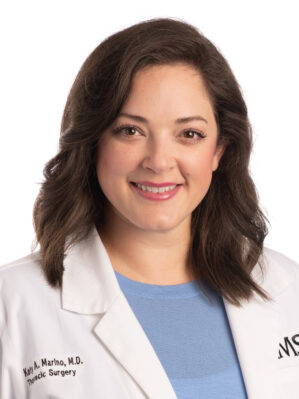


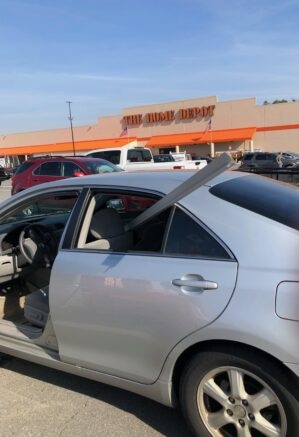
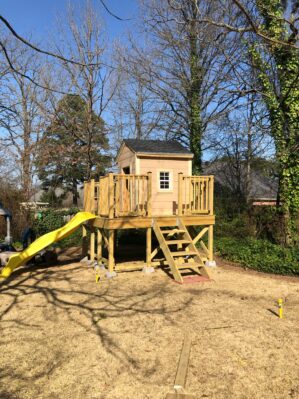
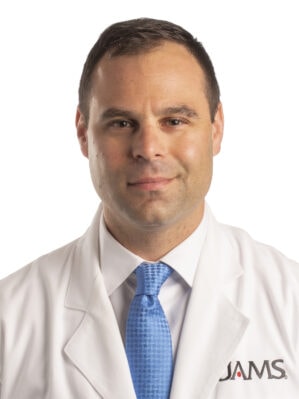
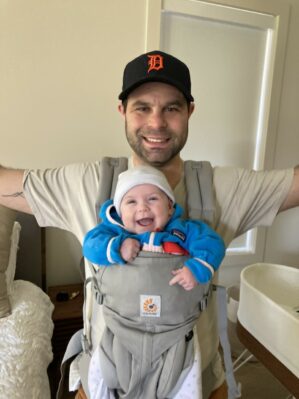
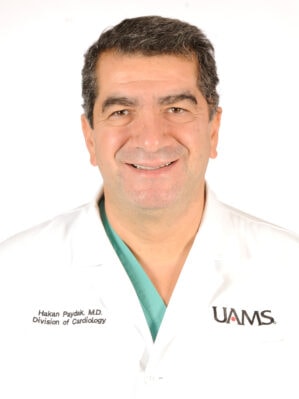
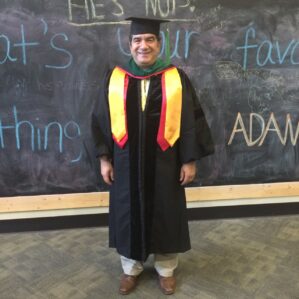

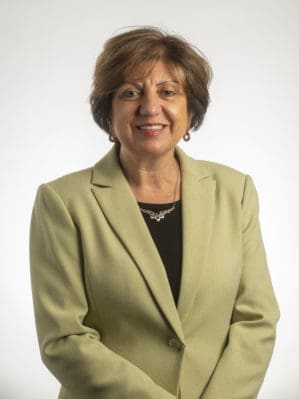
 COVID-19 really made Alexa Martin, M.D., a third-year resident in the Department of Family and Preventive Medicine, see the “big picture.”
COVID-19 really made Alexa Martin, M.D., a third-year resident in the Department of Family and Preventive Medicine, see the “big picture.”